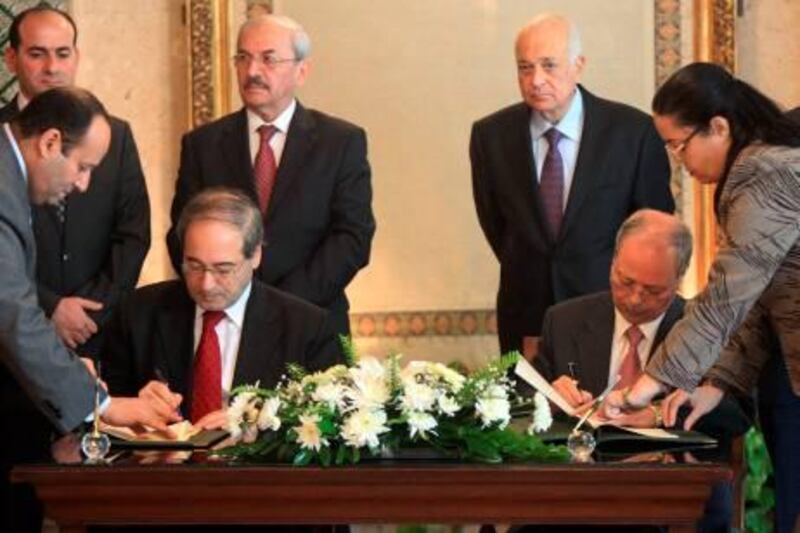Damascus //Syria finally agreed yesterday to let Arab League observers into the country, to monitor implementation of a peace deal in which it pledged to stop violence against demonstrators, pull troops out of cities and free thousands of political prisoners.
Faisal Al Maqdad, Syria's deputy foreign minister, signed the observers accord in Cairo, after six weeks of prevarication by Damascus that had resulted in the Arab League imposing unprecedented economic sanctions over non-compliance and threatening to refer the issue to the United Nations Security Council.
Speaking after the signing, Arab League chief Nabil Al Arabi said an advance team of monitors would be in place before Friday, a key time of protests and confrontation between demonstrators and security forces.
"The protocol is a mechanism to go to Syria and move freely to ensure the implementation of the Arab initiative on Syria. What counts is good faith in implementation," Mr Al Arabi said.
Experts specialising in human rights, legal and security matters, and journalists would follow the advance delegation in, Mr Al Arabi said.
The Arab League also said it would press ahead "within days, not more than a week" with plans to meet Syrian opposition groups and then invite the Syrian authorities to open talks with them about a transition to democracy.
The Syrian government has not held formal talks with any opposition groups, which have said there can be no negotiations while a violent crackdown against protesters is underway.
In Damascus, Syrian foreign minister Walid Moallem said the government would be "serious, objective and professional in dealing with the observers' mission".
The Arab League teams would be "free to move" in protest centres, in coordination with and under the protection of the Syrian authorities, he said, but not allowed onto military bases.
Speaking at a news conference, Mr Moallem said the Arab League team would vindicate official claims that the regime of president Bashar Al Assad is facing a terrorist uprising, not brutally suppressing a largely peaceful popular uprising demanding civil rights from their authoritarian rulers.
"We welcome every sincere Arab effort to resolve the crisis and the observers will see that there are armed terrorist groups wreaking havoc and killing people," he said.
According to the latest United Nations count, more than 5,000 civilians and defecting soldiers have been killed by Syrian security forces since a pro-democracy uprising began more than nine months ago.
UN human rights commissioner Navi Pillay said last week that Syrian authorities were guilty of "systematic" abuse, including rampant torture and a shoot-to-kill policy against unarmed civilians.
Yesterday, the UN General Assembly passed a resolution condemning human rights in Syria.
Mr Moallem also pledged that the Syrian authorities were sincere in trying to bring freedoms and democracy to the country.
"We want to come out of the crisis through building modern and safe Syria that is an example for democracy and plurality and all contributions are welcome," he said.
Opposition groups immediately warned that the regime was trying to buy time and prevent a referral to the UN Security Council.
Even as the announcements about the agreement were being made, activists said at least six people had been killed or wounded by security forces, including a six-year-old young girl shot in the Midan neighbourhood of Damascus while attending a funeral of a 13-year-old killed on Sunday.
Burhan Ghalioun, head of the opposition Syrian National Council, told reporters that signing the Arab League protocol was a "ploy" by Mr Al Assad's regime. "They have no intention of implementing the initiative," he said.
Analysts in Damascus said the authorities would now face a dilemma about how to handle the observers to best meet their own interests.
"As far as the regime is concerned, it's bad to have signed the observers protocol but it would have been bad if they hadn't. It was a no-win situation for them," said an independent Syrian political analyst, on condition of anonymity.
Tanks and heavily armed security forces remain deployed across much of the country, including in urban centres such as Homs and Dier Ezzor, according to residents, and activists say killings by security forces have intensified in the last month.
"Now we will have to wait and see what happens on the ground in terms of implementation," the analyst said. "The question will be how the authorities deal with the monitors; will they really be able to get the access they need or will there be some obstacles put in the way?"
Friday could be a crucial first test of the agreement, with protesters likely to demonstrate in large numbers knowing that any violent response by security forces will be happening in front of Arab League monitors.
Syria's decision to finally sign the protocol appears to have come under pressure from Russia, with both Mr Moallem and Mr Al Arabi acknowledging Moscow's role in getting the deal inked.
Russia has given Syria crucial diplomatic cover on the international stage but on Thursday circulated a draft UN Security Council resolution critical of Damascus' "disproportionate use of force" and calling on the Arab League initiative to be fully implemented.
psands@thenational.ae






